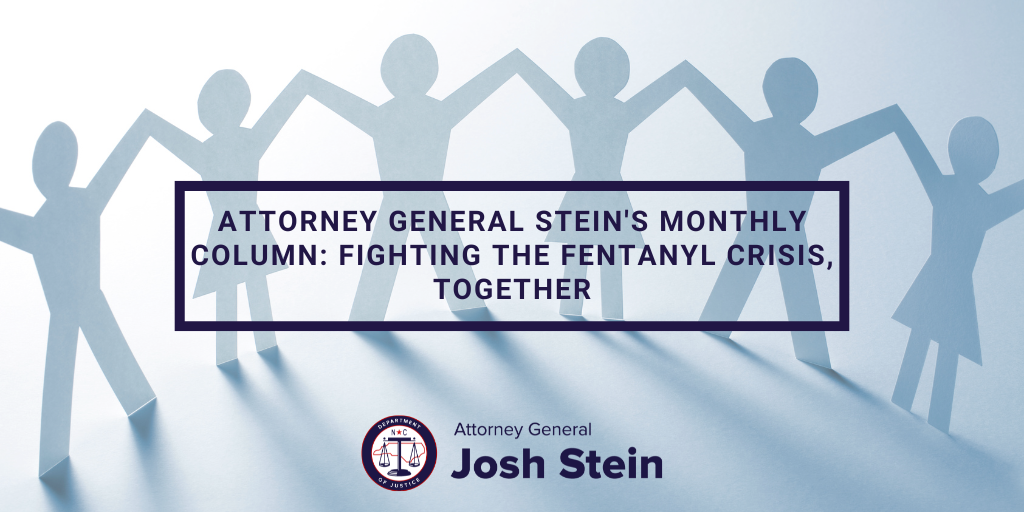
August 2024
Since I took office in 2017, I’ve traveled the state and sat with countless North Carolinians who lost their beloved child, sibling, parent, and friend to an overdose. Their hearts are broken. The opioid crisis has ravaged communities and families across our state. We’ve seen this crisis powered first by prescription pills, then heroin, and now, tragically, fentanyl, a deadly synthetic opioid.
August 31 is International Overdose Awareness Day, when we remember and honor those who have lost their lives to overdose and stand with those who grieve for them. But we must do more; we must also work together to take the fentanyl emergency head-on and prevent more of our loved ones from dying.
My office is hard at work to identify and pursue solutions that will protect people and make our communities safer. We’ve convened a statewide Fentanyl Task Force with local, state, and federal law enforcement leaders to enhance collaborations in our investigations and to make legislative and policy recommendations to tackle the fentanyl crisis.
We continue to authorize wiretaps to help law enforcement break up trafficking rings and prosecute drug trafficking cases when local district attorneys request. We are now seeking funding from the legislature to create a Fentanyl Control Unit that would help address large-scale fentanyl trafficking, wiretap, and overdose cases.
We’re holding accountable the companies that created and fueled the first wave of this crisis. My office helped lead a bi-partisan group of state Attorneys General to secure more than $50 billion in national settlements against the drug companies that helped fuel this crisis, with North Carolina receiving nearly $1.5 billion. North Carolina’s local governments are now working to invest in effective, evidence-based solutions to help people get treatment and live free of addiction.
We’re also trying to stop these drugs from getting across our border to begin with. For example, I successfully called on Congress to fund U.S. Customs and Border Protection’s installation of equipment that detects fentanyl in vehicles crossing the border.
My office also worked with members of the North Carolina General Assembly to draft and champion the Stop Counterfeit Pill Act, which became law in May 2023. The law addresses the growing threat of counterfeit pills containing fentanyl, methamphetamine, and other dangerous drugs. We also strengthened North Carolina’s new anti-money laundering statute to increase the cost of doing business in our state.
These are just some of the actions my office has taken to reduce the supply of fentanyl in our state. Together, we must also reduce the demand and desire for this insidious drug. This means supporting people and teaching them the skills needed to navigate the specific risks caused by fentanyl and other dangerous drugs.
One thing we all have the power and ability to do is focus on developmental skills and resources that will help strengthen our young people’s resistance to substance misuse. My office developed a series of webinars and town halls to reach parents, caregivers and community leaders across the state to help our kids thrive. It’s called Protecting the Next Generation of North Carolinians (www.ncdoj.gov/nextgenwebinar), and we discuss topics of early intervention, mental health resources, and how to pay attention to signs kids are struggling.
As we do this work, I never lose sight of the people I’ve met across the state who have lost someone they love to addiction and overdose. Together, we must continue to do everything we can to help people fight their addiction and get treatment and live healthy lives in recovery. That’s how we build a healthier, happier, safer, and stronger North Carolina.
